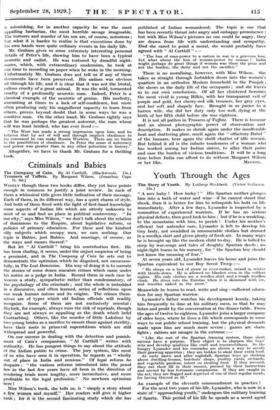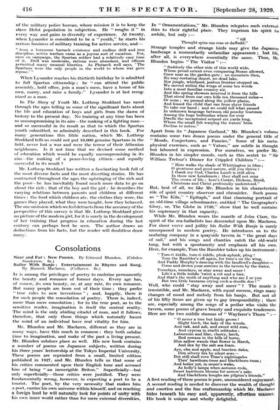Youth Through the Ages " A BOY baby ! How
lucky ! " His Spartan mother plunges him into a bath of water and wine—if he cannot stand that shock, then it is better for him to relinquish his hold on life immediately. After a few days, Lysander is inspected by a committee of experienced warriors. If he has no serious physical defects, then good luck to him ; but if he is a weakling, to the mountains with him, to perish ! Under -his mother's efficient but untender care, Lysander is left to develop his tiny body, not swaddled in innumerable clothes but dressed in a woollen shirt and given plenty of fresh air. In many ways he is brought up like the modern child to-day. He is lulled to sleep by war-songs and tales of doughty Spartan deeds ; no night-light burns in' his nursery, for " the Spartan boy should not know the meaning of fear."
At seven years old, Lysander leaves his home and joins the Spartan equivalent to our Boy Scout Troop :-
" He sleeps on a bed of straw or river-rushes, mixed in winter with thistle-down. He is allowed no blanket even in the coldest nights. His only clothes are a woollen shirt and a rough woollen cloak. He dives into the Eurotas when it is skimmed with ice, and wrestles naked in the snow."
Meanwhile he learns to read, write and sing—sufficient educa- tion for any Spartan warrior.
Lysander's father watches his development keenly, taking him frequently to dine at his military mess, so that he may listen and profit by the conversation at the dinner table. From the ages of twelve to eighteen, Lysander joins a larger company of older boys, where he lives a life which corresponds in some ways to our public school training, but the physical demands made upon him are much more severe : games are sham fights ; rations are meagre in the extreme :- " Like the rest of the Spartan training system, these short rations have a purpose. Their object is to sharpen the boys' wits and develop qualities like craft and resourcefulness. So the hungry Lysander and his comrades am shown a way to satisfy their gnawing appetites ; they are bidden to steal their extra food.
At early dawn and after nightfall, Spartan boys go slinking about dwelling-houses, butchers' shops, poultry yards, orchards, and vegetable gardens, intent on stealing food. If they succeed, they eat their fill in their messes, praised by their instructors and envied by has fortunate companions. If they are caught in the act, they are flogged and deprived of one of their regular meals, for having thieved so ill."
An example of the eleventh commandment in practice ! For the next two years of his life, Lysander,-who is now in a state of" approaching youth," undergoes the military, training of Sparta. This period of his life he spends as a secret agent
of the military police bureau, whose mission it is to keep the slave Helot population in subjeCtion. He " roughs it " in
every way and gains in diversity of experience. At twenty, when Lysander is considered to be a "'youth,". he starts his
serious business of military training for active service, and-
" from a boresome barrack existence and endless drill and iron discipline, active warfare came as a joyous sort of vacation. For, once on campaign, the Spartan soldier had a relatively easy time of it. Drill was moderate, rations were abundant, and officers permitted many unusual liberties. As Plutarch well says, ' The Spartans were the only people in the world to whom war gave repose. "
When Lysander reaches his thirtieth birthday he is admitted to full Spartan citizenship ; he " can attend the public assembly, hold office, join a man's mess, have a house of his own, marry, and raise a family." Lysander is at last recog- nized as a man.
In The Story of Youth Mr. Lothrop Stoddard has raced through the ages telling us some of the significant facts about
the life and education of boys and girls from the dawn of history to the present day. No training at any time has been so uncompromising in its aim—the making of a fighting man— and so successful in its result as that to which the Spartan youth submitted, so admirably described in this book. For many generations this little nation, which Mr. Lothrop Stoddard tells us could not put 10,000 genuine Spartans in the field, never lost a war and were the terror of their Athenian neighbours. Is it not time that we devised some method
of education which would be equally uncompromising in its aim—the making of a peace-loving citizen—and equally successful in its result ?
Mr. Lothrop Stoddard has written a fascinating book full of the most diverse facts. and the most diverting stories. He has contrasted throughout the ages the upbringing of the rich and the poor—he has inevitably found much more data to go on about the rich ; that of the boy and the girl ; he describes the varying relations between parents and children at different times ; the food which children ate, the clothes they wore, the games they played, what they were taught, how they behaved. The one omission which we feel detracts from the accuracy of the perspective of this survey is that Mr. Lothrop Stoddard gives no picture of the modern girl, for it is surely in the development of her training that progress in education during the last century can perhaps best be seen. The author draws no deductions from his facts, but the reader will doubtless draw many.



































 Previous page
Previous page